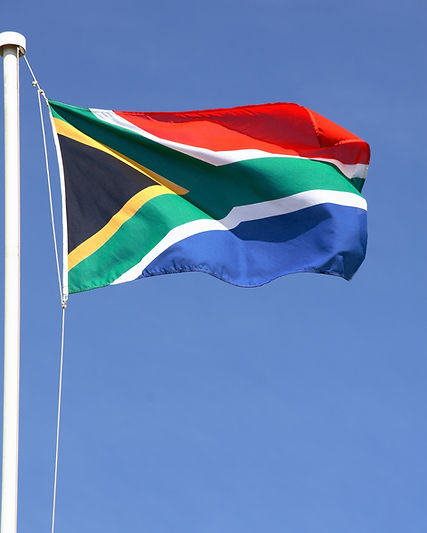Not in Our Name: Afrikaners Respond to the Misuse of Our Story in U.S. Politics
Afrikaners speak out against the political misuse of their identity in the USA – a topic currently gaining prominence with reports in the New York Times, Washington Post, and locally.
As South Africans and Afrikaners, we write this response with concern and conviction. The Trump administration’s plan to prioritize white South Africans for refugee status, while drastically cutting overall refugee admissions, have brought our identity into the spotlight in ways that are deeply troubling.
We reject the narrative that casts Afrikaners as victims of racial persecution in post-apartheid South Africa. This framing, now being used to support the far-right “Great Replacement” theory in the United States, is not only misleading, but also dangerous. It distorts the realities of South Africa, weaponizes our history, and reduces a complex social context and necessary levelling of playing fields into a simplistic symbol of white decline.
Let us be clear: South Africa faces serious challenges – crime, inequality, and the enduring legacy of apartheid. But these issues affect South Africans of all races. To cherry-pick white suffering and elevate it above others is dishonest and harmful. It feeds extremist ideologies that perpetuate division and have inspired real-world violence, including mass shootings.
We are not pawns in America’s culture wars. We are South Africans, part of a diverse, evolving nation still grappling with its past and striving toward a more just future. Our identity is not monolithic, nor is it defined by animosity between historical groupings. Afrikaners have done harm in the past, and we acknowledge that. As citizens of post-apartheid South Africa, we have dedicated ourselves to building our country. Singling us out as victims of multiracialism alienates us from our fellow-South Africans and harms relationships that have been fostered over the past 30 years.
What concerns us most is the hijacking of our ethnic identity by fringe groups - both in South Africa and abroad. Projects like “Make Afrikaners Great Again” do not represent us. They misrepresent our history and misappropriate our culture to promote exclusionary and racialized ideological agendas. We refuse to let organisations such as Afriforum and the Solidarity Movement speak for us – no single organisation has a clear or legitimate mandate to speak on behalf of all Afrikaners. Afrikaners like us, who trace our South African roots to the 17th and 18th centuries choose to call ourselves members of an inclusive and diverse Afrikaans-speaking community. We share a language, and our cultural traditions and religious roots are the same, but our community holds a diversity of views. This diversity is entrenched in our folklore and it is our strength, not our weakness. South Africa’s diversity enriches us.
The idea that white South Africans deserve special asylum status because of their race undermines the very principles of refugee protection. Vulnerability - not race -should guide humanitarian policy. To elevate white suffering above others is to reinforce a racialized worldview that elevates whiteness above others and sees white identity as under existential threat. This is not a reflection of our values or our lived experience. Calling crime in South Africa ‘white genocide’ at a moment when Gaza and Sudan are showing in real time what that actually means, is crass and narcissistic.
This response is signed by Afrikaners who believe in truth, justice, and the importance of resisting the misuse of history. We urge our fellow South Africans and international observers to challenge these distorted narratives and to recognize the dignity of all people - not just those who fit a political agenda.
Co-Signed:
Anneliese Burgess, joernalis en skrywer
Rudi Buys, leadership and diversity consultant
Prof. Wannie Carstens, extraordinary professor, Northwest University
Ds. Andries Cilliers, Dutch Reformed Church
Prof. Fanie Cloete, emeritus professor, Universities of Johannesburg and Stellenbosch
Prof. Piet Croucamp, associate professor in political studies and international relations, Northwest University
Frederik de Jager, author
Prof. Pierre de Vos, professor in constitutional law, University of Cape Town
Louise du Plessis, Lawyers for Human Rights
Dr. Stan du Plessis, economist and executive head, Stadio
Max du Preez, author and journalist
Louis Gaigher, commissioning editor, Wits University Press
Rudolf Gouws, economist
Gert Grobler, former South African ambassador
Chris Heymans, freelance business commentator
Gielie Hoffman, management consultant, author
Willem Kempen, journalist
Dr. Lindie Koorts, historian, University of Pretoria
Nick Koornhof, former MP
Justice Johann Kriegler
Ruda Landman, journalist and author
JP Landman, political and economic analyst
Barend La Grange, community development specialist
Andrew le Roux, business leader and councillor
Prof. André le Roux, University of Cape Town
Dr. Pepe Marais, deputy head, Joe Public
Prof. Martin Oosthuizen, deputy vice-chancellor, Northwest University
Chris Otto, co-founder of the PSG group and chairperson of Zeder Investments
Nina Overton-de Klerk, emeritus professor in strategic communication, University of Johannesburg
Hans Pienaar, author
Truida Prekel, innovation consultant
Dr. Jurie Schoeman, theologian and minister of the Dutch Reformed Church
Chris Spies, peacebuilding and mediation specialist
Deborah Steinmair, author
Dr. Susan Steynberg, former deputy director of library services, University of cape Town
Dr. Mareli Stolp, pianist and academic
Dr. Petrus Strijdom, spiritualist and theologian
Ds. Rudi Swanepoel, Dutch Reformed Church
Adv. Jacob van Garderen
Prof. A.A. van Niekerk, emeritus professor in philosophy and emeritus director of the Centre for Applied Ethics, University of Stellenbosch
Prof. Anthoni van Nieuwkerk, professor in international relations, UNISA
Ali van Wyk, journalist
Dawie Jacobs, former ambassador and political commentator
Dr. Cornel Malan, independent strategic consultant
Mercia Schoeman, author
Dr Marilet Sienaert, former Executive Director: Research at the University of Cape Town
Prof Louise du Toit, professor in philosophy, Stellenbosch University









.jpg)